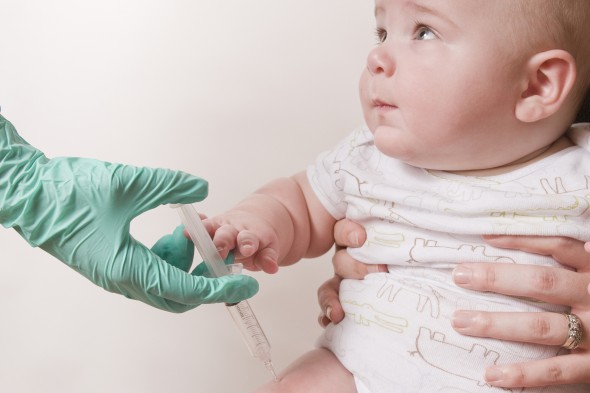What’s causing resurgence of measles in U.S.?

The MMR vaccine is generally given to children at 12 to 15 months old. Photo: Mandie Mills/Centers for Disease Control and Prevention
If the U.S. was declared free of the measles in 2000 by the Centers for Disease Control, why is the virus suddenly circulating in the population again?
“The main reason we’re seeing a resurgence now is the same reason we could have seen a resurgence last year or next year — there is not a sufficiently high level of immunity among the population to block the spread of measles when re-imported back into the United States,” said Mark Dworkin, professor of epidemiology.
Since an outbreak at Disneyland in December, more than 100 people have been infected in 14 states, according to the CDC. Last week, five cases were confirmed at a Cook County daycare center.
It’s unlikely the Illinois cases are related to the Disneyland outbreak, said Susan Bleasdale, assistant professor of clinical medicine and medical director in infection prevention — it could be another strain imported from outside the U.S.
“We have eliminated routine circulation of the measles within the population and are only seeing cases now when it gets reintroduced by someone who goes to another country where measles is endemic and they come back sick or incubating it,” Dworkin said.
The disease is highly contagious and spreads through droplets, mostly by coughing and sneezing, Dworkin said. Symptoms include a rash of tiny red spots. Measles can lead to serious complications, such as pneumonia and encephalitis (swelling of the brain). Death has been reported in 1 of every 1,000 cases.
The MMR vaccine protects against measles, mumps and rubella. Children generally receive the vaccine at 12 to 15 months old and another booster at 4 to 6 years old. The second booster was added in 1989 to provide 95 percent immunity against the diseases, Bleasdale said. “From people not being vaccinated or having some waning immunity, there’s about 10 percent of people in the U.S. likely susceptible if exposed to the measles,” she said.
Adults who are not sure they are protected, either from vaccination or having a confirmed case of measles, can also receive the vaccine.
“Vaccines give the body an exposure to an attenuated virus,” Dworkin said. “If you eventually become infected with the measles virus, the immune system already has memory, which allows it to ward off the effects much faster and prevent disease.”
Opposition to vaccinations
Some parents choose not to vaccinate their children — another factor in the outbreak, said Richard Novak, professor and chief of infectious diseases. Some do not vaccinate for religious reasons; others fear a link between the MMR and autism, an association that started with a now-discredited 1998 article in the British medical journal The Lancet.
“The paper was false — 10 of 13 authors later retracted it and said it was based on false data,” Novak said. “The myth about autism and the measles vaccine has been perpetuated, even though there have been numerous scientific studies published showing there’s no association.”
Illinois has a 97 percent vaccination rate and it’s unlikely that UIC would become the center of an outbreak, Bleasdale said.
UIC requires all students living in campus residence halls to show proof of immunity against measles, mumps and rubella, complying with Illinois Department of Public Health regulations, said Michael Ginsburg, associate vice chancellor for student affairs.
Still, college communities can host outbreaks of preventable diseases, Dworkin said. Outbreaks of the mumps have been reported on campuses in recent years and an outbreak of measles in 1985 at a downstate Christian Science college led to 128 cases and three deaths, he said.
Students who aren’t sure they have been vaccinated for measles should visit their physician to be tested for immunity, Novak said. “If someone hasn’t been vaccinated and they come in contact with someone who’s infected, they are going to get it because it’s very contagious,” he said.
